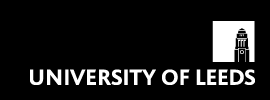
|

|
|
Welcome. I am Paul Martin, a professor in the School. I am now into my second stint as head of the Department of Pure Mathematics. Here are a few personal thoughts on ...

Firstly some informal defining of terms from the heading above:
Pure maths :=
not necessarily applied maths
(i.e.,
maths the importance of which extends beyond a single application)
strength := internationally agenda setting activity
Mathematics is the language and toolkit of science and technology.
This is a demand-side perspective on Mathematics.
On the supply-side we have the benefits of abstraction;
and the capacity for intrinsic beauty.
Pure Mathematics is sometimes broken down,
for bookkeeping purposes,
into four intrinsic subdisciplines:
algebra;
analysis;
geometry and
number theory.1,2
Overarching these is a more foundational discipline of logic,
consisting roughly of computability; model theory and proof theory.
Leeds Pure Maths is a large research activity in the field,
in terms of staff numbers,
and we aim to be active in
all of
these disciplines. In practice,
of these disciplines at Leeds only number theory is presently
missing as a research strength.
Furthermore,
in practice there is no clear division between activities in
Pure and Applied mathematics, and the overall
connected nature of strong research
activity at Leeds across the wide spectrum of mathematics
is a particularly striking feature.
Some random examples of strengths are
EPSRC funded projects (including a Programme Grant) in, or involving:
cluster algebras ;
diagram algebras ;
``topological'' quantum groups ;
applications of geometry to theoretical physics (e.g. ``type-1.5 superconductors'') ;
homotopy-type theory,
and indeed all of the abovementioned aspects of logic.
In practice the best way to follow our work is probably through our
scholarly and research articles.
These are published in international research journals;
are also often found on the arXiv ;
and often on our homepages.
Here are some indicative examples
(in fact these examples are from my first stint as HoD - I will do a round
of updates shortly):
We also run a large number
(typically more than one per day)
of open-to-the-public research seminars in the area.
From time to time we run international research conferences and
workshops (day long or even week-long sessions with multiple
speakers from research groups around the world,
covering research themes and agendas set by workers here at Leeds).
Examples of bodies that fund our work (for a variety of reasons of their own) include HEFCE, EPSRC, RS, Leverhulme, IMA, IoP, LMS, EU, USAF, Templeton, ...
This page is about research, but we adhere to the Russell Group philosophy that university teaching and research function symbiotically.
2. Organisationally, the School includes "research groups" with some similar names to these. This is a different story however, articulating some strategic research aims of the School - which are often cross-disciplinary. For example the AGIS Research Group contains Integrable Systems while the Analysis Research Group does not, although IS is at least as close to (b) as it is to (a,c)!
3. J Partington says of this paper: "A massive (and technically a tour-de-force) paper in one of the leading journals for Analysis. This is combining some of the latest ideas in Banach space theory - in particular, constructions used to solve major open questions - in an operator-theoretic context."